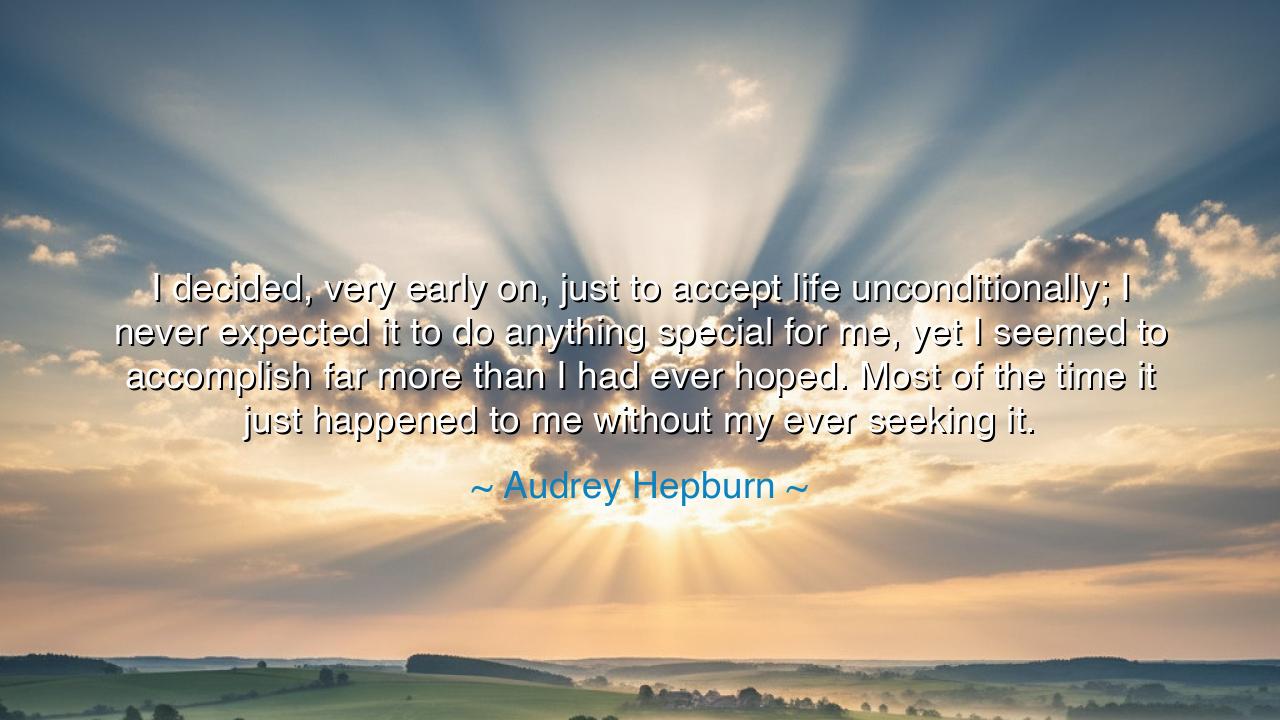
I decided, very early on, just to accept life unconditionally; I
I decided, very early on, just to accept life unconditionally; I never expected it to do anything special for me, yet I seemed to accomplish far more than I had ever hoped. Most of the time it just happened to me without my ever seeking it.






"I decided, very early on, just to accept life unconditionally; I never expected it to do anything special for me, yet I seemed to accomplish far more than I had ever hoped. Most of the time it just happened to me without my ever seeking it." These profound words by Audrey Hepburn reveal the wisdom of acceptance and the unexpected joy of living without the heavy burden of expectation. Hepburn’s words reflect a universal truth—that life often unfolds in ways we do not plan for, and when we surrender the need to force or control outcomes, we open ourselves to the possibility of receiving far more than we could have ever anticipated. Her journey was one of grace, where humility and acceptance led to a life of fulfillment, far surpassing the hopes she had for herself.
This philosophy resonates deeply with the Stoics, whose teachings emphasized the importance of accepting the things we cannot change, and focusing on virtue and inner peace as the ultimate goals of life. Epictetus, a Stoic philosopher, taught that we must distinguish between what is within our control—our thoughts, our actions, and our responses—and what lies outside of it, like fortune, circumstances, and the actions of others. According to Epictetus, happiness is found not in the pursuit of external success or recognition, but in the acceptance of life as it comes and a commitment to living virtuously. Audrey Hepburn’s acceptance of life echoes this ancient wisdom: by releasing expectations and embracing life with open hands, she achieved far more than she might have if she had clung to specific desires.
Consider the life of Socrates, whose understanding of life mirrors Hepburn's philosophy in some respects. Socrates was not concerned with wealth, power, or fame, but with the pursuit of wisdom and truth. He lived his life with the profound belief that true happiness came from living authentically, without attachment to material success or societal approval. Despite being sentenced to death for his beliefs, Socrates remained steadfast in his commitment to his principles, accepting life’s unpredictable nature without resistance. His life, like Hepburn’s, serves as a testament to the power of acceptance—by embracing life unconditionally, Socrates achieved a form of immortality through his teachings, his integrity, and his unwavering commitment to truth.
In more modern times, Helen Keller provides a powerful example of accepting life’s limitations while still accomplishing extraordinary things. Born deaf and blind, Keller’s challenges were immense, yet she embraced life with an unshakable determination to contribute to the world. She did not dwell on the limitations imposed by her condition; instead, she chose to accept her circumstances and find ways to adapt and thrive. Through her acceptance and perseverance, Keller became an advocate for the disabled, a prolific writer, and a symbol of the power of the human spirit. Like Hepburn, Keller did not expect life to hand her an easy path, but she found fulfillment and accomplishment by surrendering to the flow of life while fully embracing her own potential.
Hepburn’s own life mirrors this acceptance as well. From a young age, she faced hardships, including growing up in war-torn Europe and experiencing personal loss. Yet, she did not view life as something to be controlled or manipulated to fit a particular mold. Instead, she accepted the twists and turns of her journey—whether it was her rise to fame as a movie star, her humanitarian efforts, or her role as a mother—and allowed each experience to shape her. Hepburn’s life was not defined by the struggles she faced, but by how she responded to them with grace, compassion, and integrity. Her unconditional acceptance of life’s unpredictability allowed her to flourish in ways that were more profound than many of her peers.
The lesson here is one of embracing life as it is. Often, we become bogged down by the weight of our expectations, the desires for specific outcomes, and the need to control the narrative of our lives. Audrey Hepburn shows us that there is a quiet strength in accepting life’s natural course and trusting that things will unfold as they are meant to. By letting go of rigid expectations, we free ourselves to experience the fullness of life—its joys, its challenges, and its unexpected rewards. Acceptance is not about complacency or resignation; it is about having the courage to meet life head-on, to embrace uncertainty, and to find peace in the process.
In practical terms, we can apply Hepburn’s wisdom by reflecting on where we might be resisting the natural flow of life. Are there areas in our lives where we are holding onto unrealistic expectations? Are we so focused on controlling the outcomes that we miss the beauty of the journey itself? By practicing acceptance, we can begin to shift our perspective and focus on the present moment, trusting that by aligning ourselves with life’s natural rhythm, we will find the opportunities for growth and fulfillment that we need. Like Hepburn, we may discover that when we release the need to force things, life has a way of unfolding in remarkable and unexpected ways.
In the end, Audrey Hepburn’s approach to life teaches us that while we cannot control everything, we can control how we respond. Acceptance of life’s inherent unpredictability is the key to a life well-lived. By letting go of the need to force outcomes and instead focusing on living with intention and grace, we open ourselves to a deeper experience of joy and accomplishment. Let us embrace life unconditionally, and in doing so, we will find that the journey itself is often the greatest reward.






AAdministratorAdministrator
Welcome, honored guests. Please leave a comment, we will respond soon